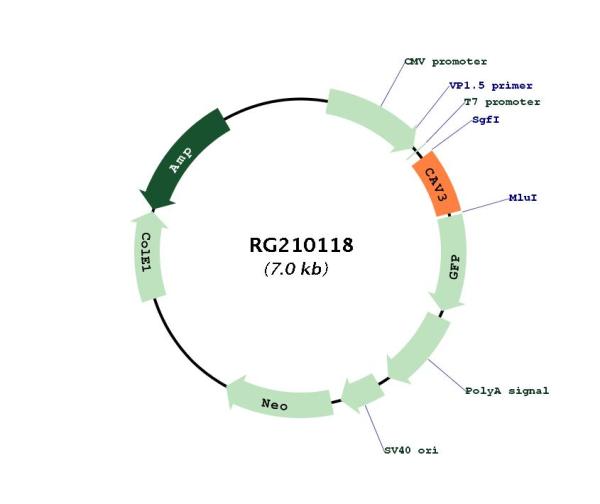Caveolin 3 (CAV3) (NM_001234) Human Tagged ORF Clone
CAT#: RG210118
- TrueORF®
CAV3 (tGFP-tagged) - Human caveolin 3 (CAV3), transcript variant 2
ORF Plasmid: DDK
Lentiviral Particles: DDK DDK w/ Puro mGFP mGFP w/ Puro
AAV Particle: DDK
"NM_001234" in other vectors (6)
Specifications
| Product Data | |
| Type | Human Tagged ORF Clone |
| Tag | TurboGFP |
| Symbol | Caveolin 3 |
| Synonyms | LGMD1C; LQT9; MPDT; RMD2; VIP-21; VIP21 |
| Vector | pCMV6-AC-GFP |
| E. coli Selection | Ampicillin (100 ug/mL) |
| Mammalian Cell Selection | Neomycin |
| Sequence Data |
>RG210118 representing NM_001234
Red=Cloning site Blue=ORF Green=Tags(s) TTTTGTAATACGACTCACTATAGGGCGGCCGGGAATTCGTCGACTGGATCCGGTACCGAGGAGATCTGCC GCCGCGATCGCC ATGATGGCAGAAGAGCACACAGATCTCGAGGCCCAGATCGTCAAGGATATCCACTGCAAGGAGATTGACC TGGTGAACCGAGACCCCAAGAACATTAATGAGGACATAGTCAAGGTGGATTTTGAAGACGTGATCGCAGA GCCTGTGGGCACCTACAGCTTTGACGGCGTGTGGAAGGTGAGCTACACCACCTTCACTGTCTCCAAGTAC TGGTGCTACCGTCTGTTGTCCACGCTGCTGGGCGTCCCACTGGCCCTGCTCTGGGGCTTCCTGTTCGCCT GCATCTCCTTCTGCCACATCTGGGCGGTGGTGCCATGCATTAAGAGCTACCTGATCGAGATCCAGTGCAT CAGCCACATCTACTCACTCTGCATCCGCACCTTCTGCAACCCACTCTTCGCGGCCCTGGGCCAGGTCTGC AGCAGCATCAAGGTGGTGCTGCGGAAGGAGGTC ACGCGTACGCGGCCGCTCGAG - GFP Tag - GTTTAA >RG210118 representing NM_001234
Red=Cloning site Green=Tags(s) MMAEEHTDLEAQIVKDIHCKEIDLVNRDPKNINEDIVKVDFEDVIAEPVGTYSFDGVWKVSYTTFTVSKY WCYRLLSTLLGVPLALLWGFLFACISFCHIWAVVPCIKSYLIEIQCISHIYSLCIRTFCNPLFAALGQVC SSIKVVLRKEV TRTRPLE - GFP Tag - V |
| Restriction Sites |
SgfI-MluI
Cloning Scheme for this gene
Plasmid Map

|
| ACCN | NM_001234 |
| ORF Size | 453 bp |
| OTI Disclaimer | The molecular sequence of this clone aligns with the gene accession number as a point of reference only. However, individual transcript sequences of the same gene can differ through naturally occurring variations (e.g. polymorphisms), each with its own valid existence. This clone is substantially in agreement with the reference, but a complete review of all prevailing variants is recommended prior to use. More info |
| OTI Annotation | This clone was engineered to express the complete ORF with an expression tag. Expression varies depending on the nature of the gene. |
| Product Components | The ORF clone is ion-exchange column purified and shipped in a 2D barcoded Matrix tube containing 10ug of transfection-ready, dried plasmid DNA (reconstitute with 100 ul of water). |
| Reconstitution | 1. Centrifuge at 5,000xg for 5min. 2. Carefully open the tube and add 100ul of sterile water to dissolve the DNA. 3. Close the tube and incubate for 10 minutes at room temperature. 4. Briefly vortex the tube and then do a quick spin (less than 5000xg) to concentrate the liquid at the bottom. 5. Store the suspended plasmid at -20°C. The DNA is stable for at least one year from date of shipping when stored at -20°C. |
| Reference Data | |
| RefSeq | NM_001234.3, NP_001225.1 |
| RefSeq Size | 1329 bp |
| RefSeq ORF | 456 bp |
| Locus ID | 859 |
| UniProt ID | P56539 |
| Cytogenetics | 3p25.3 |
| Protein Families | Druggable Genome, Transmembrane |
| Protein Pathways | Focal adhesion |
| Gene Summary | This gene encodes a caveolin family member, which functions as a component of the caveolae plasma membranes found in most cell types. Caveolin proteins are proposed to be scaffolding proteins for organizing and concentrating certain caveolin-interacting molecules. Mutations identified in this gene lead to interference with protein oligomerization or intra-cellular routing, disrupting caveolae formation and resulting in Limb-Girdle muscular dystrophy type-1C (LGMD-1C), hyperCKemia or rippling muscle disease (RMD). Alternative splicing has been identified for this locus, with inclusion or exclusion of a differentially spliced intron. In addition, transcripts utilize multiple polyA sites and contain two potential translation initiation sites. [provided by RefSeq, Jul 2008] |
Documents
| Product Manuals |
| FAQs |
| SDS |
Resources
Other Versions
| SKU | Description | Size | Price |
|---|---|---|---|
| RC210118 | CAV3 (Myc-DDK-tagged)-Human caveolin 3 (CAV3), transcript variant 2 |
USD 150.00 |
|
| RC210118L1 | Lenti ORF clone of Human caveolin 3 (CAV3), transcript variant 2, Myc-DDK-tagged |
USD 450.00 |
|
| RC210118L2 | Lenti ORF clone of Human caveolin 3 (CAV3), transcript variant 2, mGFP tagged |
USD 450.00 |
|
| RC210118L3 | Lenti ORF clone of Human caveolin 3 (CAV3), transcript variant 2, Myc-DDK-tagged |
USD 450.00 |
|
| RC210118L4 | Lenti ORF clone of Human caveolin 3 (CAV3), transcript variant 2, mGFP tagged |
USD 450.00 |
|
| SC302995 | CAV3 (untagged)-Human caveolin 3 (CAV3), transcript variant 2 |
USD 150.00 |
{0} Product Review(s)
Be the first one to submit a review






























































































































































































































































 Germany
Germany
 Japan
Japan
 United Kingdom
United Kingdom
 China
China

